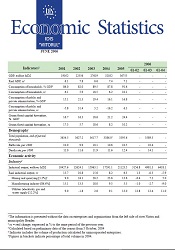

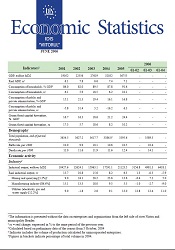
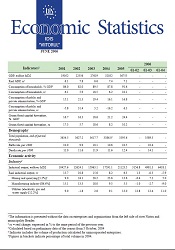
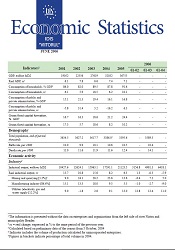
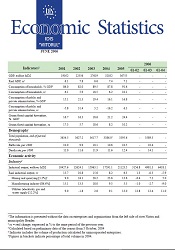
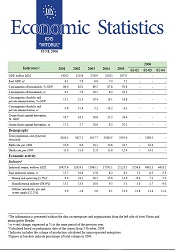
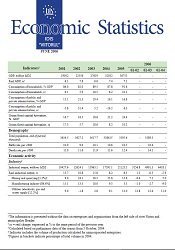
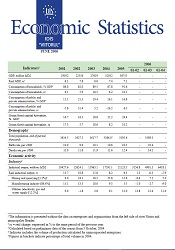
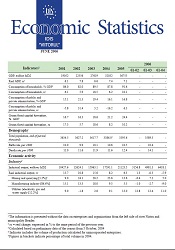
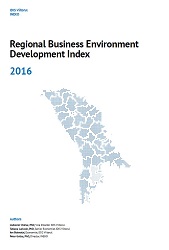
Over the last eight years, IDIS “Viitorul” has acquired a great deal of experience in strengthening the Moldovan business environment by having established the National Business Agency (NBA), granting it the needed support. The National Business Agency is an informal advocacy platform for business environment, which brings together some 35 business associations and the Chamber of Commerce and Industry around the discussion table. Lately, the NBA promoted a series of business environment priorities through the public-private dialogue. Hence, in 2015, IDIS Viitorul created the Local Business Agency with the support provided by the Chamber of Commerce and Industry, with the aim to foster economic development of regions through the involvement of business environment representatives in the decision-making process. In this way, the business environment of country districts had the opportunity to set forth its priorities at the local level to be subsequently promoted into the authorities’ public agenda through IDIS Viitorul and the Chamber of Commerce and Industry.
More...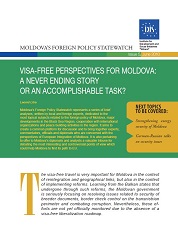
The visa-free travel is very important for Moldova in the context of reintegration and geographical links, but also in the context of implementing reforms. Learning from the Balkan states that undergone through such reforms, the Moldovan government is seriously focusing on resolving issues related to security of breeder documents, border check control on the Transnistrian perimeter and combating corruption. Nevertheless, these efforts are not yet officially monitored due to the absence of a visa-free liberalization roadmap.
More...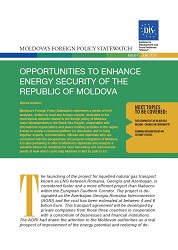
Keywords: Moldova energy supply;
The launching of the project for liquefied natural gas transport known as LNG between Romania, Georgia and Azerbaijan, is considered faster and a more efficient project than Nabucco within the European Southern Corridor. The project is designated as the Azerbaijan-Georgia-Romania Interconnector (AGRI) and the cost has been estimated at between 4 and 6 billion Euro. This transport agreement will be developed by private companies from those three countries in cooperation with a consortium of businesses and financial institutions. The AGRI had drawn the attention to the Moldovan authorities as a real prospect of improvement of the energy potential and reducing of dependence on Russian natural gas. Taking in advance the potential of the project that assures a stable and reliable route of LNG supplies, it might be an advantage for Moldova to be involved in the project. Construction of a liquefied gas terminal in the Giurgiulesti port would be a priority for the energy security of Moldova, especially considering entirely the dependence of country on Russian gas supplies.
More...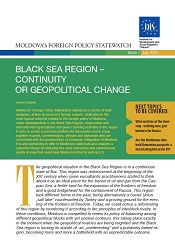
Keywords: Blsack-Sea in Geopolitics;
The geopolitical situation in the Black Sea Region is in a continuous state of flux. This region was rediscovered at the beginning of the XXI century when some euroatlantic practitionners started to think about it as an ideal place for the transit of oil and gas from the Cas¬pian Sea, a fertile land for the expansion of the frontiers of freedom and a good bridgehead for the containment of Russia. This region took different forms in the past, being alternatively a Soviet Union „salt-lake” counteracted by Turkey and a proving ground for the erec¬ting of the frontiers of freedom. Today, we could notice a reformating of this region by reordering it according to the principles of inter-block rivalry. In these conditions, Moldova is compelled to renew its policy of balancing among different geopolitical blocks with yet unclear contours, this taking place exactly in the moment when the geopolitical rivalries are being reignited and the Black Sea region is losing its statute of an „uninteresting” and a putatively tamed re¬gion, becoming more and more a battlefield with an unpredictable outcome.
More...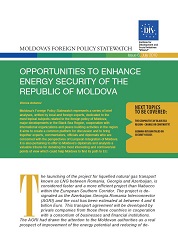
Keywords: Russian market for Moldovan Wine;
In vino veritas, the old saying goes, but not complacent for Russia! The famous aphorism ‘In Vino Veritas’ is clearly not for Ghenadie Onischenko, Russian Chief Sanitary Inspector, whose precious indications about wine quality gained an inglorious reputation last years. The Agency is all known for its harsh protectionist policies, applied to the states that are tied up on Russian market with their low-cost wines, vegetables or milk. Earlier, the above-mentioned agency has ‘saved’ Russian consu¬mers from the ‘peril’ of Belarusian milk (June 2009), and then in January 2010, it also rescued Russians from the US ‘chicken and pork meat’, which was considered potentially maleficent for the population, but politically acceptable af¬ter a new ‘package deal’ on US-Russia trade agreements.
More...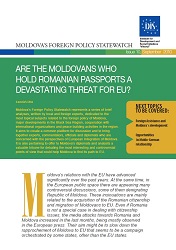
Keywords: Moldova-EU migration; Shengen; Visa-free travel;
Moldova’s relations with the EU have advanced significantly over the past years. At the same time, in the European public space there are appearing many controversial discussions, some of them denigrating Republic of Moldova. These insinuations are mainly related to the acquisition of the Romanian citizenship and migration of Moldovans to EU. Even if Romania is not a special case in dealing with citizenship issues, the media attacks towards Romania and Moldova increased in the last months, being mostly observed in the European press. Their aim might be to slow down the rapprochement of Moldova to EU that seems to be a campaign orchestrated by some states, other than the EU states.
More...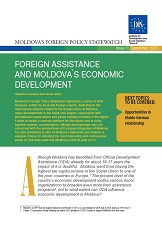
Keywords: Moldova National Economy;
Although Moldova has benefited from Official Development Assistance (ODA) already for about 16-17 years the impact of it is doubtful. Moldova went from having the highest per-capita income in the Soviet Union to one of the poor countries in Europe.1 The present level of the country’s economic development incites various donor organizations to broaden even more their assistance programs2, but to what extent can ODA influence economic development in Moldova?
More...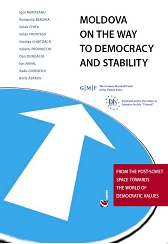
Keywords: post-communist Moldoiva;
Since the disintegration of the USSR in 1991, Republic of Moldova has made clear progress towards the consolidation of its state, of its military and civil institutions, making itself notable on the geopolitical map of Europe. However, Moldova seems to be still scarcely present on the mental maps of the decision-makers from the West. Unlike the Baltic nations, that embedded themselves into the mind of the European public as a cohesive group of free nations, distinct from their poorer neighbors (Belarussians, Russians or Ukrainians, whit their more violent history after the disintegration of the Soviet Union), Moldova was approached with prudence if not completely neglected so that when important EU officials have remembered, after 2003, about the post-soviet origins of this republic, the Chisinau diplomacy felt offended. // The book provides a conceptual and analytic foundation for addressing the agenda of the security sector reform in Moldova. Given the tremendous tasks that have challenged Moldova in the last decade we all expect that the energy and commitment of its political, economic and cultural elites will be at least equivalent to it. By “anatomizing”, these crisis-prone issues have invited us to reflect upon their complex interdependence, as well as towards effective policies in Moldova.
More...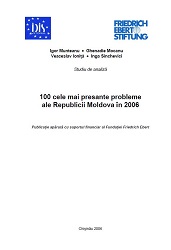
Keywords: development of Republic of Moldova;
This intelligent product provides comparative and analytical elements for the adoption of superior techniques for evaluating decisions that involve significant costs for our society. At the same time, the intention of the authors of this study is to encourage critical reflection and the comparative approach to the elaboration of efficient and effective public policies, as well as to the qualitative increase of the level of public debates on these topics of interest. // The research team consisted of 3 experts and a coordinator. The study was coordinated by Igor Munteanu, and the research team consisted of Ghenadie Mocanu (political analyst), Veaceslav Ioniţă (economist), Inga Sinchevici (sociologist). // The authors of the study sincerely thank the Friedrich Ebert Foundation for the support provided in the elaboration of this research, but also for the encouragement it offered us during this complex study.
More...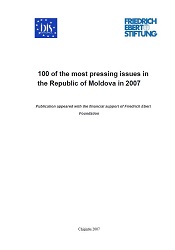
Keywords: EU Action Plan for Moldova; Civic or Parish culture; identity politics; intimidation of journalists; Budgetary crisis;
The peculiarity of 2007 was the fact that it was the last year of the implementation of the EU Action Plan by the Republic of Moldova facing a severe drought. In 2006, the authorities of the Republic of Moldova had put forth the efforts to convince the European officials and the western partners of the possibilities of the country to implement the stipulations of the Action Plan RM-EU, the efforts have been materialized by the creating and sending reports regarding the implementation of the RM-EU AP. In 2007, the Moldovan authorities are facing the situation when they have to prove to the citizens and to themselves that the implementation of the Action Plan RM-EU did not represent just efforts but also clear results in bringing Moldova closer to EU. Or the implementation of this very document represented a capacity and availability test of the Republic of Moldova to approach the European Union. // This smart product offers comparative and analytical elements for the adoption of some superior techniques of evaluation of some decisions that involve important costs for our society. Meanwhile, the intention of the authors of this study is to encourage critical thinking and comparative approach regarding drafting of efficient and effective public policies as well as qualitative growth of the level of public debates on these issues of interest.
More...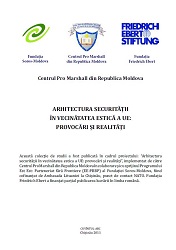
Keywords: security East of EU;
The round table in Chisinau involved in discussions experts from Austria, Bulgaria, the Czech Republic, Estonia, Georgia, Germany, Latvia, Lithuania, Moldova, Norway, Poland, Romania, Switzerland and Ukraine, the discussions being preceded by several meetings with people with decision-making power and relevant personalities / representatives of NGOs from the Republic of Moldova. // The main purpose of the discussions was to raise public awareness and facilitate public debate on issues related to the reform of the security system of our country and to develop a unique approach between decision makers and civil society representatives on the future of security of the Republic of Moldova. existing in the new EU Member States. Another aim was to learn from the knowledge gained by European countries in the field of various security models.
More...